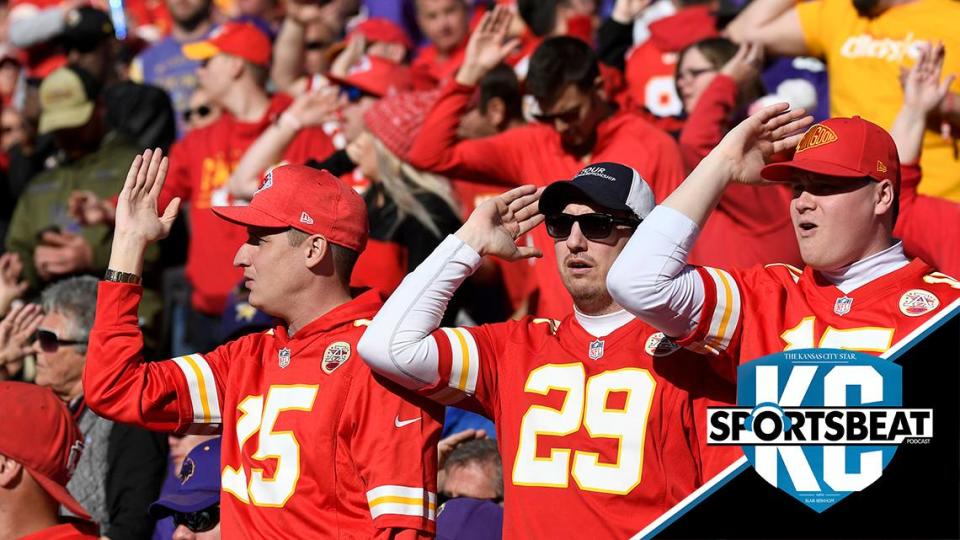Why billboards urging Chiefs to ‘change the name and stop the chop’ return for playoffs
As excitement builds among Chiefs fans ahead of a fifth-consecutive AFC Championship, another group of Kansas Citians are also gathering steam for a familiar cause: protesting the team’s name and chant.
Visible through the smoke from tailgaters’ barbecues are protesters with signs that read “Change the name,” and “Stop the Chop,” calling out the Chiefs and the NFL for having the words “End Racism” spelled out in the endzone and on helmets, but still using a name, imagery and cheer that many say trivializes Native American culture.
In addition to protesters’ signs, billboards with the same messages are scattered across I-35, I-70 and I-435 as fans drive to and from GEHA Field at Arrowhead Stadium.
The billboards — paid for by the Kansas City Indian Center — might be newly hoisted for this playoff season, but the message behind them has been voiced consistently in the city and nationwide. Native American groups all across the country have been protesting sports teams’ usage of their cultures’ imagery for years.
Similar protests happened in Washington D.C. before its football team changed its name, and in Cleveland before its baseball team changed its name. They’re also happening in Atlanta regarding the city’s baseball team.
The Kansas City Indian Center and Not In Our Honor have been working together since 2005 in an effort to raise awareness of how the football team’s name and imagery are harmful to Native American communities.
The group protests in the parking lot outside the stadium, which they say is something they do for every game, regardless of whether it’s the preseason, regular season or playoffs. Their efforts get more attention in the postseason since there are more eyes on Kansas City.
Gaylene Crouser, the executive director of the Kansas City Indian Center, said the fight against the name and imagery is over 30 years old. She said that someone joined their protest before Saturday’s game that was protesting back in the 1990s when the Chiefs used to have a man dressed in Native American attire ride a horse on the field.
WHAT’S THE GOAL OF PROTESTING THE CHIEFS NAME AND IMAGERY?
The protesters’ goal? To educate the community and the fans about the dangers of the name, even if it puts them as protesters in danger. Crouser said that people often get in their face, flip them off and yell at them.
“What I wish they knew is that the wellbeing of people, Native Americans, human beings, is more important than these brands and images and games,” Crouser said. “It will still be Kansas City’s football team if they’re called something else and rebranded something else. They’ll still be Kansas City’s football team.”
“The Chop” is one of the team’s traditions that local Native American organizations have issues with. The chant features fans waving their arm in a “chopping” motion and is usually started when the PA system plays a song that mimics a Native American chant.
What’s the deal with ‘The Chop?’ These are the debates to know if you’re a new Chiefs fan
Rhonda LeValdo, a media communications instructor at Haskell Indian Nations University in Lawrence and a founder of the Not in Our Honor chapter, said taunts like this are harmful because they reduce their culture to stereotypical gestures.
She said it’s damaging to Native American children to see so many people openly mocking their culture, a stance that is backed by research from the American Psychological Association.
“If regular Kansas City people don’t see us as regular citizens of Missouri or Kansas, then how are they supposed to respect us as people?” LeValdo said.
She recently posted a video on Twitter of a hostile encounter with a fan.
In the video, the fan is heard yelling at the protesters, suggesting that they get a “$30,000 check,” referring to a common myth that Native American people receive financial reparations from the government, which is untrue. LeValdo and Crouser both said this encounter is an example of how they’ve experienced fans spreading stereotypes that negatively affect Native Americans.
“We’re not being seen as human beings, and we’re trying to make sure people understand that,” LeValdo said. “There are a lot of historical inaccuracies that are being promoted by the name, the chop and we’re just trying to make sure that people understand all the things that affect us, and it’s not just at the game.”

FANS IN FAVOR OF A NAME CHANGE
Not in Our Honor started a petition called End Racism KC, asking fans to sign to get the team to change the name. As of Thursday, the petition has over 15,000 signatures.
LeValdo said that along with joining the organizations’ joint protests, signing the petition is the best way for fans to help their cause.
Crouser added that fans should contact the team’s sponsors, such as GEHA and HyVee, and let them know they want to see the name changed.
The Kansas City Chiefs did not respond to requests by The Star for comments on the protests happening outside the stadium during game days or the billboards.
In recent years, the team has worked with some Native American groups to change some practices at games, including banning face paint that mimics Native Americans and directing fans not to “chop” when the song is blared through the stadium, but Crouser said the team has not reached out to the Kansas City Indian Center for the group’s input on these changes.
“I wish I could be like ‘go team,’ but I can’t because they’re hurting my people,” Crouser said.

 Yahoo Movies
Yahoo Movies 
